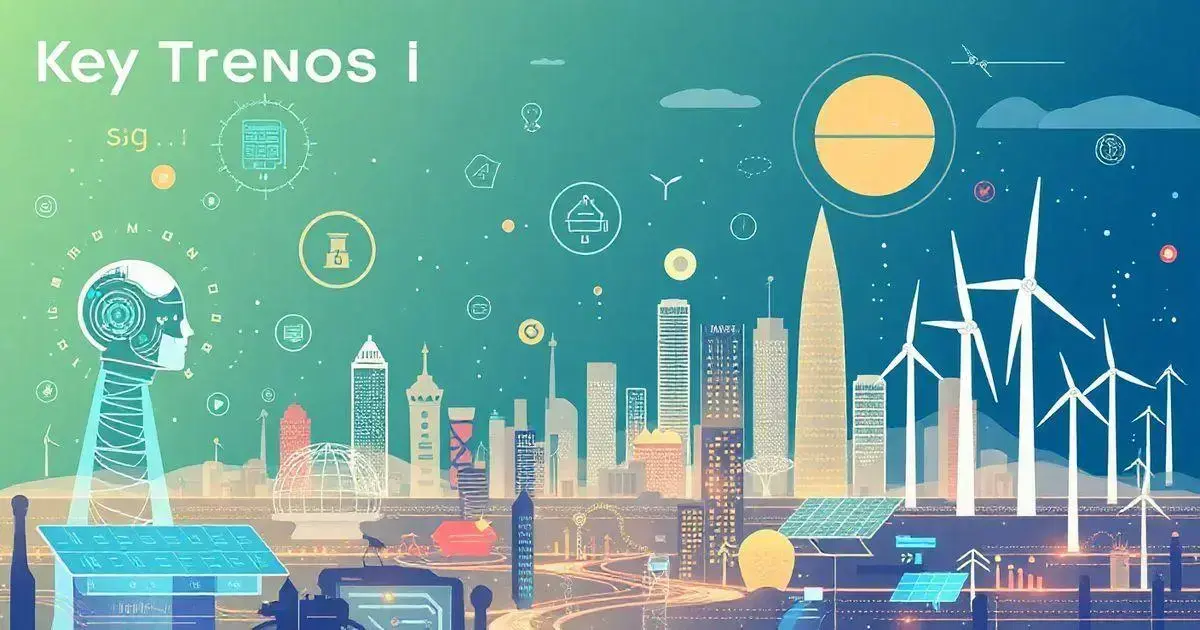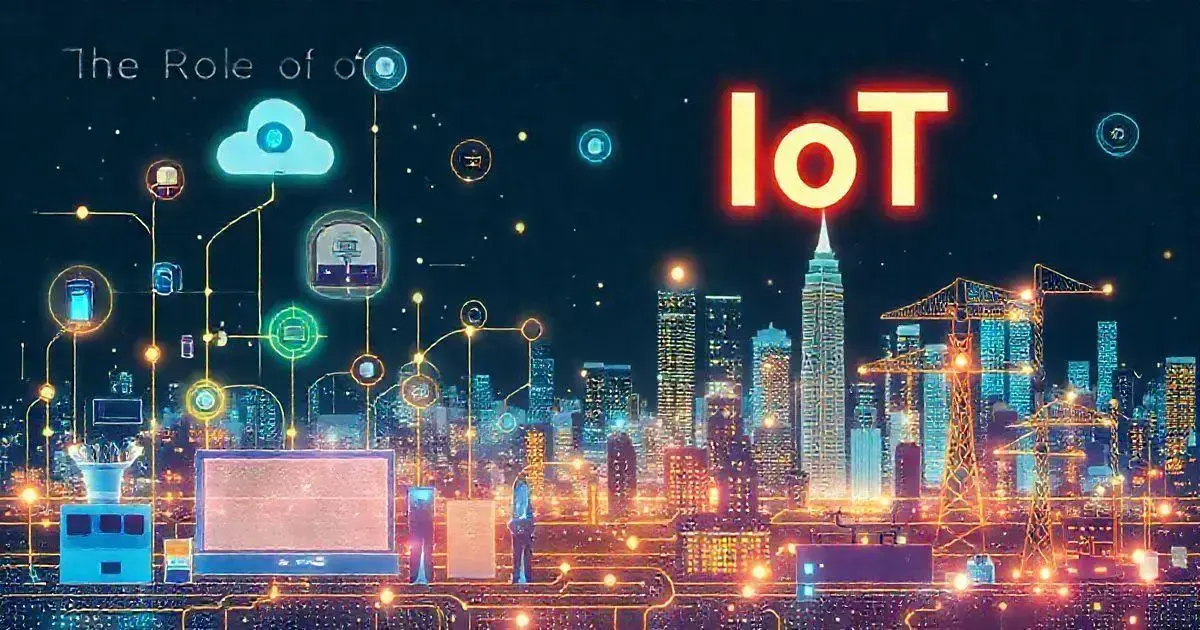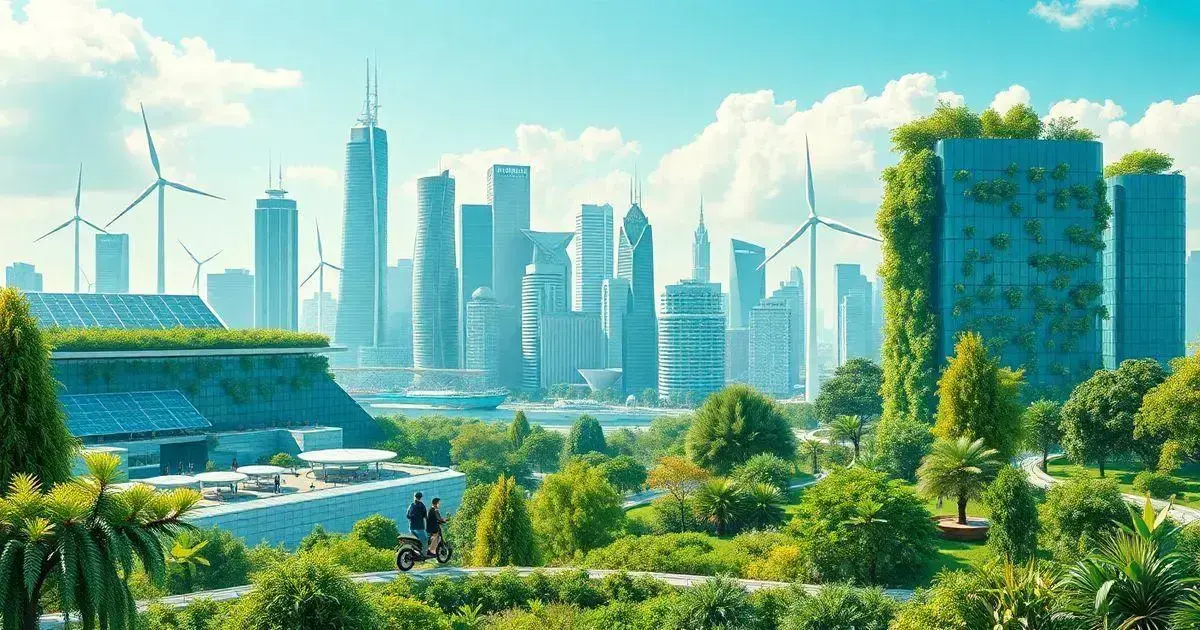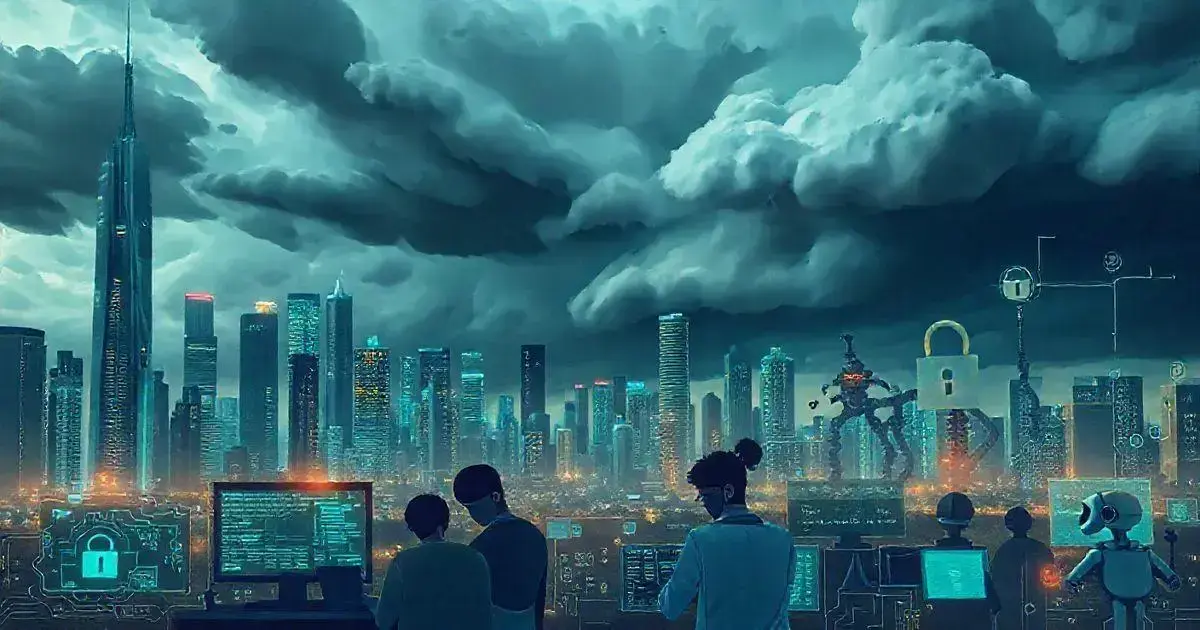The future of tech innovations is a thrilling domain that holds the potential to redefine how we live, work, and connect. From groundbreaking advancements in artificial intelligence to the seamless integration of IoT devices, these technologies are shaping a smarter and more efficient world.
Emerging trends like sustainability in tech are not just addressing environmental concerns but are also opening doors to new business opportunities. These innovations are driving industries to adopt eco-friendly solutions, making technology an ally in global sustainability efforts.
Dive into the transformative impact of tech innovations and discover how they are paving the way for a future filled with endless possibilities and groundbreaking discoveries.
Understanding Tech Innovations
Understanding tech innovations is vital in today’s rapidly changing world. Technology influences many aspects of our lives, from how we communicate to how businesses operate. With advancements happening at an unprecedented rate, it’s crucial to keep abreast of emerging trends.
Innovation refers to the introduction of new ideas or methods. It plays a pivotal role in enhancing efficiency and solving complex problems. Tech innovations encompass various fields including healthcare, finance, and education, driving significant improvements in these sectors.
One of the key aspects of understanding tech innovations is recognizing their impact on society. For instance, the introduction of blockchain technology has transformed data security and transparency in transactions. Similarly, the integration of artificial intelligence (AI) in customer service has improved user experiences by providing instant responses and tailored interactions.
Moreover, grasping the concept of tech innovations helps individuals and organizations adapt and leverage these changes effectively. By embracing innovation, businesses can enhance their competitive edge and foster sustainability. It’s essential to remain open-minded and proactive in exploring these advancements to fully understand their potential benefits.
Key Trends in Technology

Key trends in technology are constantly evolving, shaping the way we interact with the world. Understanding these trends is essential for individuals and businesses alike. One significant trend is the rise of artificial intelligence (AI), which is now integrated into various applications, providing enhanced decision-making capabilities and operational efficiency.
Another major trend is the growing importance of cloud computing, enabling easy data access and collaboration across different platforms. This technology allows companies to scale their operations without significant upfront investments in infrastructure.
Additionally, 5G technology is transforming connectivity. With faster speeds and lower latency, 5G supports advancements in IoT devices and enhances user experiences. As industries adopt 5G, we can expect significant improvements in areas like telemedicine and smart cities.
Moreover, cybersecurity remains a critical focus due to the increasing threat of data breaches. Organizations are investing more in protecting their data and securing their networks, as safety becomes a top priority in technology adoption.
In the realm of personal devices, wearables are on the rise. From fitness trackers to smartwatches, these devices offer insights into health and lifestyle, encouraging users to maintain a healthier routine.
Finally, sustainability in tech is gaining traction. Businesses are exploring eco-friendly products and practices to reduce their carbon footprint and appeal to environmentally conscious consumers.
Understanding these key trends in technology not only prepares individuals for what lies ahead but also provides organisations the insights needed to innovate and remain competitive.
Impact of AI on Future Innovations
The impact of Artificial Intelligence (AI) on future innovations is profound and wide-reaching. AI has the potential to change how we approach problem-solving in numerous fields. For instance, in healthcare, AI can analyze vast amounts of data to assist in diagnosing diseases and tailoring treatment plans for patients.
In the realm of business, AI facilitates automation of mundane tasks, freeing up human resources for more critical projects. From predictive analytics to customer relationship management, AI equips companies with tools to enhance productivity and drive growth.
Moreover, AI is spearheading advancements in transportation. With the development of self-driving vehicles, the industry is set to experience a major revolution, potentially reducing traffic incidents and improving transit efficiency.
Another area of significant impact is education. AI-driven platforms can offer personalized learning experiences, catering to individual student needs and pacing. This fosters a more effective learning environment compared to traditional methods.
Furthermore, AI influences innovations in sustainability. By optimizing energy use and enhancing waste management, AI can help mitigate the environmental impact of industrial processes.
As we look to the future, it’s clear that AI will continue to influence technological innovations across various sectors, making them more efficient and aligned with human needs.
The Role of IoT in Modern Tech

The role of Internet of Things (IoT) in modern tech is increasingly significant as it connects devices and systems to create smarter environments.
IoT refers to the network of physical devices embedded with sensors, software, and other technologies that communicate and share data. This connectivity offers numerous advantages, such as enhanced efficiency, improved data collection, and the ability to automate tasks.
In smart homes, IoT devices help users monitor their energy usage and control appliances remotely. For instance, smart thermostats can learn user patterns to optimize heating and cooling, resulting in energy savings.
In healthcare, IoT devices play a crucial role in patient monitoring. Wearable devices can track vital signs and alert healthcare providers about any abnormalities, leading to timely intervention and improved patient outcomes.
Moreover, in manufacturing, IoT improves operational efficiency by enabling predictive maintenance. Machines equipped with sensors can monitor their performance and notify operators of potential issues before they cause downtime.
IoT also supports the development of smart cities, where data from various sources can be integrated to improve public services, manage traffic, and enhance safety. By utilizing IoT technologies, cities can create a more efficient and sustainable living environment.
As we advance, the role of IoT in modern technology will keep expanding, paving the way for innovations that enhance productivity and improve quality of life.
Emerging Technologies to Watch
Emerging technologies are reshaping our world, offering new solutions and possibilities. One prominent technology is quantum computing, which has the potential to solve complex problems much faster than traditional computers. This advancement could revolutionize fields such as cryptography and drug discovery.
Another technology to watch is augmented reality (AR). AR enhances the real world with digital elements, creating immersive experiences in gaming, education, and retail. By blending the physical and digital worlds, AR transforms how we interact with our environment.
Blockchain technology is also gaining attention beyond cryptocurrency. Its ability to provide secure and transparent transaction records is making waves in industries like finance, supply chain, and healthcare.
Biotechnology is evolving, particularly in genetic engineering and synthetic biology. These advancements support the development of new therapies and potentially improve food production methods.
5G technology is another key emerging trend. The faster mobile internet speeds it offers will drive the growth of IoT, autonomous vehicles, and smart cities, enabling seamless connectivity.
Lastly, renewable energy technologies, such as solar and wind, are rapidly advancing. Innovations in energy storage and efficiency are making these sustainable solutions more accessible and reliable.
By keeping an eye on these emerging technologies, we can better understand the innovations that will shape our future.
Sustainability and Tech Innovations

Sustainability and tech innovations are closely linked as technology offers solutions to environmental challenges. One significant area is renewable energy, where innovations in solar and wind energy technologies are becoming more efficient and affordable.
Smart grids are revolutionising energy distribution, allowing for better management of power resources. These grids use technology to optimise energy use, integrating renewable sources smoothly into existing systems.
In agriculture, precision farming uses tech innovations like drones and IoT sensors to monitor crops. This minimizes waste, optimises resource use, and enhances crop yields sustainably.
Furthermore, recycling technologies are emerging that improve the sorting and processing of materials. Innovations in this field help minimise waste and promote a circular economy, where materials are reused and recycled.
Carbon capture technology also represents a groundbreaking innovation. It helps to capture and store carbon emissions before they enter the atmosphere, contributing to climate change mitigation efforts.
As these innovations develop, they create new opportunities for businesses and communities to embrace sustainability in practical ways. Embracing technology in this manner supports the global goal of a sustainable future and highlights the pivotal role tech plays in achieving these aims.
Future of Work and Technology
The future of work and technology is seen as a landscape that evolves rapidly due to advancements in various fields. One major shift is the rise of remote work, which technology has enabled through tools such as video conferencing and collaboration platforms. These innovations allow employees to work from anywhere, providing flexibility and improving work-life balance.
Additionally, artificial intelligence (AI) is transforming job roles across industries. AI can automate routine tasks, freeing employees to focus on more complex responsibilities. This shift enhances productivity and drives innovation.
Another important aspect is the role of upskilling and reskilling. As technology changes, employees must adapt by learning new skills. Many companies offer training programs to support their workforce in this transition, ensuring they remain competitive.
Digital communication tools also play a vital role in shaping the future work environment. They facilitate collaboration and improve connectivity among team members, regardless of their physical locations.
Furthermore, there is increasing emphasis on diversity and inclusion in the workplace, fostering a culture that encourages different perspectives and creativity. Technology can support these initiatives by allowing companies to reach a broader talent pool.
As we look to the future, the combination of these factors indicates a workplace that is more adaptable, inclusive, and driven by technology. Embracing these changes will be essential for companies aiming to thrive in this new reality.
Challenges Facing Tech Development

The rapid pace of change in technology presents significant challenges for organizations. They often struggle to keep up, leading to outdated systems and practices.
Additionally, as technology advances, so do cyber threats, which can result in data breaches and damage to reputations.
Funding and resources are also a major concern, particularly for startups and smaller companies that have innovative ideas but lack the financial support necessary to secure investment.
Moreover, there is a growing skills gap in the workforce. The demand for skilled workers in emerging technologies is increasing, yet there aren’t enough trained professionals available, causing delays in projects.
Regulation poses another challenge, as governments are still figuring out how to effectively regulate new technologies while fostering innovation. This makes it difficult to strike the right balance.
Finally, the environmental impact of technology development is crucial. Many companies struggle to balance profitability with their environmental responsibilities.
Predictions for the Next Decade
Predictions for the next decade in technology are both exciting and varied. One major trend is the growth of artificial intelligence (AI). AI will continue to evolve, making processes smarter and more efficient. Tech innovations will play a key role in driving progress across industries such as healthcare, finance, and education.
Another significant prediction is the expansion of 5G technology. This advancement will enhance connectivity, allowing for faster communication and the growth of IoT devices. As tech innovations enable smarter homes and cities, the potential for innovation will expand even further, creating a more interconnected world.
Sustainability will also be a crucial focus. Future tech innovations are expected to emphasize eco-friendly practices and reduce environmental impact. As companies prioritize sustainable solutions, technology will continue to advance, shaping our world in ways that are smarter, greener, and more efficient.
Frequently Asked Questions about the Future of Tech Innovations
What are the main trends in technology for the next decade?
Key trends include the growth of artificial intelligence, the expansion of 5G technology, and the emphasis on sustainability.
How does artificial intelligence impact businesses?
AI enhances efficiency by automating tasks, improving customer service, and providing advanced data analysis.
What role does IoT play in modern technology?
IoT connects devices to improve data collection and enhance automation, making both homes and cities smarter.
How can small businesses benefit from tech innovations?
Small businesses can leverage technology to streamline operations, reach new customers, and compete against larger firms.
What challenges do companies face in adopting new technologies?
Challenges include keeping up with rapid technological changes, cybersecurity threats, and the need for skilled workers.
Are there sustainable technologies that businesses can adopt?
Yes, technologies in renewable energy, waste management, and resource optimisation can help organizations operate sustainably.
